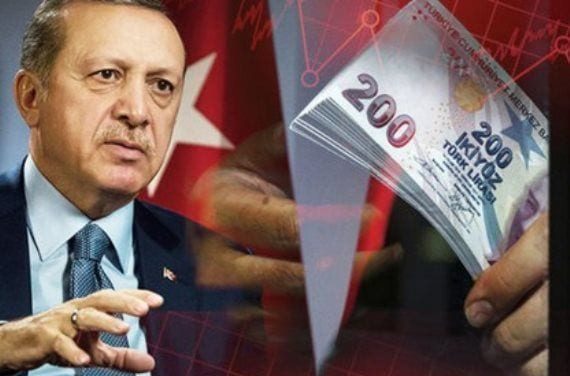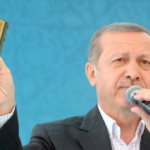(Reuters) – Turkey’s lira mounted a massive turnaround late on Monday after President Erdogan introduced a series of steps that he said will ease the burden of the ailing currency on Turks, while vowing to press on with a low-rates policy that led to the currency slide.
The lira , which was down more than 11% at around 18.4 versus the dollar earlier, strengthened some 10% after the announcement by Erdogan. It traded at 14.90 versus the dollar at 1831 GMT.Report ad
The recovery comes as the dollar came under pressure as U.S. Treasury yields slipped following a blow to Democratic spending plans in Washington and on concerns about the continued spread of the Omicron coronavirus variant.
Speaking after a cabinet meeting, Erdogan said the measures would ensure citizens would not have to convert their lira into foreign currency over the lira crash, including a deposit guarantee promise.
“We are presenting a new financial alternative to citizens who want to alleviate their concerns stemming from the rise in exchange rates when they evaluate their savings,” Erdogan said.
“With the interest rate cuts, we will all see how inflation will start falling within months,” he said. “This country will no longer be a heaven for those adding to their money with high interest rates, it will not be an import haven.”Report ad
He also called on “everyone with money, access to finance” to contribute to investments and pledged steps to aid exporters and pensioners.
The president’s push for 500 basis points of interest rate cuts since September has set off Turkey’s worst currency crisis in two decades, with the lira crashing 35% in the last 30 days.
Economists have called his low-rates model reckless and said inflation would soar to beyond 30% next year.
Ipek Ozkardeskaya, senior analyst at Swissquote Bank, said the current economic outlook was like “a truck with no brakes”, adding Erdogan’s newly announced measures diverged significantly from the usual market practices.
“Turkey is going into a complicated process, they are no longer playing the game by the rules,” Ozkardeskaya said.
“Each unorthodox step taken is adding a level of complexity to the strategy and makes it impossible to predict a fruitful outcome for dealing with the actual crisis.”
ISLAMIC USURY
Erdogan defended his economic policy on Sunday and likened the currency volatility to attacks on the country’s economy that have roots in 2013 nationwide protests, which began in Istanbul’s Gezi Park over access to green space.
“We’re lowering interest rates. Don’t expect anything else from me. As a Muslim, whatever (Islamic teaching) requires I will continue to do that,” he said, referring to Islamic finance in which high interest, or usury, is typically avoided.
Despite widespread criticism and the rapid fallout for the economy — including Turks’ fast eroding incomes and savings — Erdogan has forged ahead with his so-called new economic programme that prioritises exports and lending.
Under pressure from the president, the central bank cut rates again last week by 100 points, sending real rates deeper into negative territory, a red flag for investors and savers.
Inflation jumped to 21% last month and is expected to pass 30% next year.
The lira has lost more than half of its value this year and is by far the worst performer among peers for three years running, due largely to damaged monetary credibility, analysts say.
In an attempt to slow the selling and address what it called “unhealthy” prices, the central bank has intervened five times this month. Bankers’ calculations show it has sold more than $6 billion from its already depleted foreign reserves.
On Saturday, Turkey’s largest business group TUSIAD called on the government to abandon the low rates policy and return to “rules of economic science”.



